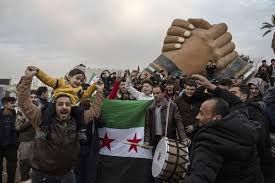The General Command, which emerged from the Department of Military Operations—the entity that now controls decision-making in Damascus following the overthrow of the Syrian regime—has expressed a desire to update UN Resolution 2254, according to its leader, Ahmed al-Sharaa (Abu Muhammad al-Julani).
During a meeting with the United Nations Special Envoy to Syria, Geir Pedersen, Sharaa discussed the need to reconsider Resolution 2254 in light of the changes that have occurred in Syria’s political landscape. He emphasized the necessity of updating the resolution to reflect the new reality on the ground.
In response, the Syrian Opposition Coalition has supported efforts to implement the UN resolution, asserting that upcoming elections must be held based on a new constitution, one that is approved by the Syrian people. This must occur within a specific timeframe and follow the mechanisms outlined in Resolution 2254.
The head of the Syrian Negotiation Commission, Badr Jamous, a body tasked with negotiating with the ousted regime, reaffirmed the Commission’s consistent position on the issue. He stressed the importance of pushing forward with the implementation of the resolution to achieve the goals of the Syrian revolution, particularly the establishment of a democratic and civil state where the people can freely choose their representatives in a safe and neutral environment.
The Commission believes that the provisions outlined in Resolution 2254 represent a legitimate pathway to achieve these objectives. They maintain that the absence of the ousted regime does not invalidate the resolution, especially since the goals it set out have not yet been achieved.
Resolution 2254, adopted by the UN Security Council on December 18, 2015, at its 7588th meeting, affirmed its commitment to Syria’s sovereignty, independence, unity, and territorial integrity, in line with the purposes and principles of the UN Charter.
Bypassing UN Resolution 2254
According to Dr. Ahmed Qirbi, a researcher at the Syrian Dialogue Center, the Syrian opposition could bypass Resolution 2254, given that it is non-binding. Dr. Qirbi suggested that Syrians could initiate a national dialogue based on the Geneva Communiqué, independent of 2254, as long as it is a Syrian-Syrian process. However, this proposal largely pertains to the current authority in Damascus.
Dr. Qirbi explained to Enab Baladi that what is required now is a clear path for initiating a national dialogue that includes all relevant parties, without exclusion or discrimination—a process the regime has rejected for years. He pointed out that the regime’s obstruction of the political process in the past has been one of the primary reasons why the Syrian conflict became internationalized. If the Department of Military Operations continues to exclude other parties, it risks re-internationalizing the issue.
He argued that launching an internal Syrian dialogue would close the door to further foreign interference, allowing the matter to remain within Syria’s internal framework.
Political Moves by the Military Operations Department
Maan Talaa, a researcher at the Omran Center for Strategic Studies, identified three key elements driving the Department of Military Operations:
They aim to establish an “Idlib model,” which they see as a safe political model for the future.
They seek to limit political discourse to their own “political leadership.”
They are opening channels for political messages to foreign states, seeking to engage them in a positive manner.
Talaa noted that Sharaa’s meeting with the UN envoy and his call to update Resolution 2254 reflects two perspectives. On the one hand, he is correct that the resolution is outdated, having been drafted in 2015, and significant changes have since occurred on the ground. On the other hand, the Department of Military Operations appears to offer a “subjective reading” of the political scene, particularly given that the conflict has largely been settled in favor of a single party. This raises the question: who will negotiate with whom?
Talaa argued that Resolution 2254 remains a valuable framework for advancing key political processes, including expanding dialogue mechanisms, ensuring inclusive political leadership, and addressing vital issues like governance, refugees, and counterterrorism.
He suggested that Sharaa’s call for an update could be seen as a “positive” step towards engaging with the political process.
Consequences of Evasion
Any attempt to evade the implementation of a participatory political process within Syria is likely to be viewed as an attempt to undermine the Geneva Communiqué. According to Dr. Qirbi, this could lead to the continuation of international sanctions on Syria, potentially even the imposition of new sanctions. A continued monopoly on power by the current leadership might also open the door to military intervention in Syria.
Dr. Qirbi emphasized that the future of the political process depends on the actions of the new authority in Damascus. He urged the leadership to act promptly to avoid missing the opportunity for domestic reconciliation and to prevent further international intervention.
He added that delays in initiating the political process would increase the likelihood of foreign intervention, while developing a roadmap for a participatory process that includes all Syrian factions could help keep Syria out of these risks.
Redefining the Political Parties
Resolution 2254 speaks of three key parties: the opposition, the regime, and civil society representatives. With the fall of the Assad regime, these designations may evolve. It’s possible that the current leadership could be considered the opposition in future negotiations, while the active parties in the former regime may now be regarded as representatives of the Syrian opposition.
As the situation evolves, we may see calls for groups like the Baath Party or the Jalali government to be included as part of the opposition in future negotiations.
This article was translated and edited by The Syrian Observer. The Syrian Observer has not verified the content of this story. Responsibility for the information and views set out in this article lies entirely with the author.


